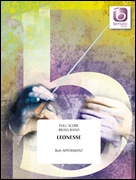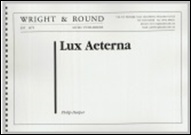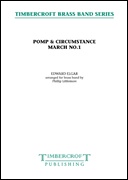Results
-
 £37.95
£37.95LE CARNAVAL ROMAN (Overture) (Brass Band - Score only) - Berlioz, Hector - Wright, Frank
Recorded on Polyphonic QPRL207D Quincentenary Concert
Estimated dispatch 7-14 working days
-
 £76.99
£76.99LEONESSE (Brass Band) - Appermont, Bert
Leonesse is the name of the castle and landed estates of Lady Guinevere, from the famous story of King Arthur. This stately concert march leads us to the old England with its legendary castles and the beautiful and impressive landscapes where many knights have died. Following a festive opening, a majestic melody symbolises the atmosphere of courtly elegance and refinement. The second part of this original composition describes, with a broad and dignified melody, the beauty and extensiveness of the English hills. Duration: 5:05.
Estimated dispatch 7-14 working days
-
 £33.00
£33.00LUX AETERNA (Brass Band) - Harper, Philip
The title Lux Aeterna (Eternal Light) can he interpreted on a number of levels. Musically it has a rather mystical feel to it,?and the single note with which the piece begins continues uninterrupted throughout, like an inextinguishable flame, or?a constant source of hope. There are lyrical and song like solo lines for cornet, flugel and euphonium. This composition was performed as part of the Cory Band's winning Brass in Concert programme in 2012.
Estimated dispatch 7-14 working days
-
 £42.95
£42.95OVATION Celebratory Overture (Martin Ellerby) (Brass Band) - Ellerby, Martin
Recorded on Polyphonic QPRL229D Ovation! Recorded on Polyphonic QPRL207D Quincentenary Concert
Estimated dispatch 7-14 working days
-
 £40.00
£40.00Pomp and Circumstance March No.1 (Brass Band - Score and Parts) - Elgar, Edward - Littlemore, Phillip
Elgar's Pomp & Circumstance March No. 1?was completed in July 1901 although the 'big tune' actually dates from earlier in that same year. It was premiered in Liverpool by its dedicatees, the Liverpool Orchestral Society, on the 19th October. It was repeated in London a few days later by Henry Wood at the Promenade concerts and the result was sensational, the audience roared its applause, and refused to allow the concert to continue. In order to restore order, Wood conducted the march three times - the only time in the history of the Promenade concerts that an orchestral item was accorded a double encore in Wood's lifetime. Duration: 6:40
Estimated dispatch 7-14 working days
-
 £50.90
£50.90RADCLIFFE CARNIVAL (Brass Band) - Barry, Darrol
Concert March. Grade: Easy/Medium.
Estimated dispatch 7-14 working days
-
 £30.00
£30.00SANTA BABY (E Flat Horn/Brass Band) - Pankhurst, Lucy
A perfect feature for your Christmas concert and an item which is guaranteed to put your audiences in the Christmas mood.
Estimated dispatch 7-14 working days
-
 £30.00
£30.00SHE'S LEAVING HOME (Low Brass and Percussion feature/Brass Band) - Duncan, Andrew
An ideal concert item to show off the lower band sections, whilst giving the cornet players a little rest! The wonderful Beatles 'sounds' have been cleverly arranged for this feature piece to bring out the real beauty of the music
Estimated dispatch 7-14 working days
-
 £54.99
£54.99Somethin' Stupid (Brass Band - Score and Parts)
In the sixties Frank and Nancy Sinatra had a huge hit with this delightfully titled song. More recently the timeless Somethin' Stupid has been in the charts once again with the version by Robbie Williams and Nicole Kidman that was featured on the groundbreaking Swing When You're Winningalbum of classic "Rat Pack" songs. Bring a little humour to any concert with this fantastic novelty item. 02:30
Estimated dispatch 7-14 working days
-
 £60.99
£60.99Song of Israel (Brass Band - Score and Parts)
Song of Israel is based on a world-famous tune, the traditional song from Israel entitles Hatikva. Roland Kernen makes creative use of this melody, presenting it a variety of styles, including a section with a 'rock' feel, to produce a cheerful concert work. 05:20
Estimated dispatch 7-14 working days
